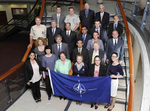Building integrity
NATO/EAPC project helps tackle corruption in defence institutions
“Translating ‘integrity’ into Ukrainian is difficult,” explains Nataliya Altyntseva, a Captain in the Ukrainian Security Service who is coming to the end of a special six-month professional development traineeship at NATO Headquarters.

“Integrity means two things in English,” she says. One meaning is synonymous with honesty, and another indicates strength or soundness. “We do not have these two meanings in one word in Ukrainian, so we try to bring the exact meaning to our people.” Hence, the Ukrainian name for NATO’s Building Integrity Initiative – buduvannya cilisnosti ta vyhovannya dobrochesnosti, or the Building of Undivided Unity and Instilling Truth.
Launched in July 2008 within the wider framework of the Partnership Action Plan on Defence Institution Building, this initiative aims to reduce corruption in the defence establishments of Allies and Partners alike.
Three nations – Poland, Switzerland and the United Kingdom – took the lead in setting up a Trust Fund, which provides practical support to promoting good governance and best practice in defence establishments. More than twelve nations have actively contributed to Phase I of the Fund.
Activities aimed at reducing the risk of corruption in defence establishments are conducted in cooperation with the non-governmental organization Transparency International and a range of implementing partners including Partnership-for-Peace Training Centres and civil society representatives.
Fighting corruption
 Good governance is a prerequisite for peace and stability, but it can be undermined by corruption. The defence sector, like all other sectors, must be accountable for the resources it receives. “Money that comes out of corruption very often finds itself in illicit trade, whether it’s human beings, arms, drugs,” says Huguette Labelle, the Chair of Transparency International’s Board of Directors. “Of course these can really destabilize countries and create havoc and a lot of insecurity for the people.”
Good governance is a prerequisite for peace and stability, but it can be undermined by corruption. The defence sector, like all other sectors, must be accountable for the resources it receives. “Money that comes out of corruption very often finds itself in illicit trade, whether it’s human beings, arms, drugs,” says Huguette Labelle, the Chair of Transparency International’s Board of Directors. “Of course these can really destabilize countries and create havoc and a lot of insecurity for the people.”
Transparency and accountability are particularly important in the aftermath of the financial crisis, believes Susan Pond, Senior Officer in the Defence and Security Economics Directorate at NATO Headquarters. “Given the economic situation, it is even more important to ensure that scarce resources are spent effectively to develop defence capabilities,” she says. “Corruption erodes public trust and makes defence forces ineffective and inefficient.”
The Building Integrity (BI) Initiative is based on several principles. First among them is the idea that each country’s situation is specific to itself, and BI action plans must be tailored on a country-by-country basis in consultation with the country’s government.
In addition, political and military leadership must strongly endorse and promote anti-corruption procedures. Anti-bribery regulations must be adopted as formal codes of conduct, and effective enforcement of the code often depends upon the efforts of a vigorous and independent monitor. Above all, defence establishments must adopt transparency as a fundamental principle.
Building capacity
 An important aspect of the Building Integrity Initiative’s programme of work is to deploy mobile teams of experts to support Partners and Allies with the development and implementation of national Integrity plans.
An important aspect of the Building Integrity Initiative’s programme of work is to deploy mobile teams of experts to support Partners and Allies with the development and implementation of national Integrity plans.
The benefits of such activities typically outweigh the relatively small cost of a sponsored internship or a training course. Reduced corruption tends to raise military effectiveness, public trust in the armed forces, and the legitimacy of the government as a whole.
More than 200 representatives from nations belonging to the Euro-Atlantic Partnership Council (EAPC) have taken part in BI capacity-builiding initiatives conducted in EAPC nations and Afghanistan. The current programme of work also features tailored events for specific countries, such as a Senior Leaders Day in Ukraine, which Nataliya helped organize in May 2009.
Nataliya attended a pilot training course on corruption held in Sarajevo in December 2008. There, she met representatives from Transparency International, NATO, and the Geneva Centre for Security Policy, and she was invited to join the team helping to prepare future courses. “When you meet real people, and they say here we have some mechanisms which work, you understand that it works,” she says.
Learning by doing
Nataliya was later selected for a traineeship at NATO Headquarters. “These Integrity traineeships are organized and paid for by the UK” as part of an overall effort to support professional development of staff working in the Ukrainian Security Sector, she explains. Similar Integrity traineeships are offered at Transparency International.
Some months into her traineeship, Nataliya gave a presentation on the current state of the Building Integrity Initiative to diplomats from Allied and Partner countries at a meeting of the Euro-Atlantic Partnership Council. Among other points, she noted that the programme’s 2010-2012 objectives include a Building Integrity Conference at the US Naval Postgraduate School in Monterey, California; several Building Integrity courses in Norway, Turkey, and other places; and Senior Leaders Days.
A possible future Senior Leader herself, Nataliya will return to her country to implement the knowledge gained at NATO. “I’m sure that my experiences will be used in Ukraine,” she says. Perhaps she will have opportunities to share what she has learned with others as well.
